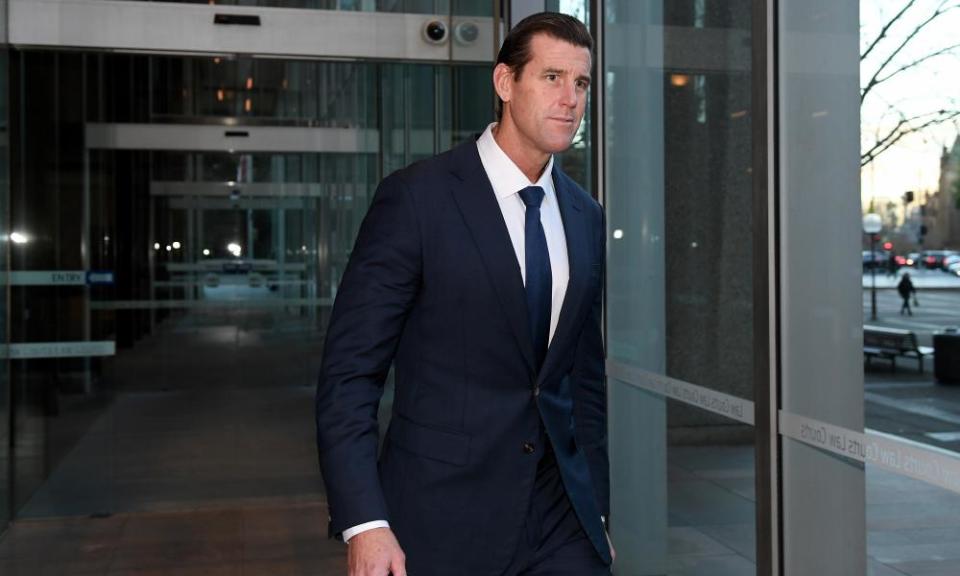MP Andrew Hastie set to testify on allegedly ‘blooded’ rookie soldier in Ben Roberts-Smith case

The assistant defence minister, Andrew Hastie, is slated to give evidence to the federal court in relation to an SAS mission in Afghanistan where a rookie soldier was allegedly “blooded”, or ordered to kill an unarmed prisoner, by Ben Roberts-Smith.
Hastie, a former SAS captain and now a Liberal MP, was confirmed on Thursday as a “likely” witness to be called on behalf of three newspapers alleged by Roberts-Smith to have defamed him over allegations of war crimes.
The newspapers have alleged in their defence documents that Victoria Cross recipient Roberts-Smith committed six murders while on deployment with the SAS in Afghanistan, as well as an act of domestic violence in Australia.
The evidence involving Hastie concerns an allegation that Roberts-Smith ordered a subordinate soldier – anonymised before the court as Person 66 – to kill an unarmed Afghan in Syahchow during a mission in October 2012. Roberts-Smith confirmed in court on Friday that Hastie was present: “he came on the mission”.
Court documents filed by the newspapers as part of their defence allege that during the mission Roberts-Smith directed Person 66 to take two prisoners from a compound where they were being held to a nearby field.
Related: Ben Roberts-Smith ‘traumatised’ by allegations he murdered unarmed civilians, court hears
It’s alleged that Roberts-Smith ordered Person 66 to shoot one of the Afghan prisoners, which he did. After the incident, Roberts-Smith is alleged to have said he had “blooded” the new soldier.
Person 66, who was not a regular member of Roberts-Smith’s patrol, is also expected to give evidence to the trial, called by the newspapers.
In his earlier opening to the case, barrister Bruce McClintock SC, appearing for Roberts-Smith, told the court “the essence of the allegation is that, gratuitously, my client [Roberts-Smith] ordered Person 66 to shoot one of two Afghan males, which Person 66 then did”.
“My client’s response to that is that the incident in question never happened,” he said.
“The only other evidence – and I use that word with quotation marks – that may be before the court is from Mr Hastie, a member of the House of Representatives. Mr Hastie has long been a commentator for the respondents and anti-[Roberts-Smith], if I could put it like that.
“His outline offers nothing probative, except that when the mission was over, he saw Person 66 looking anxious and uncomfortable. There might be many reasons, after combat, why someone looked anxious and uncomfortable.”
The newspapers allege the practice of “blooding” new soldiers – essentially an experienced senior soldier ordering a new subordinate to kill an unarmed person – occurred among Australian SAS soldiers in Afghanistan.
“‘Blooding’ refers to initiating a person in the practice of killing, or giving them the taste for killing,” the newspapers’ defence states.

Roberts-Smith has told this trial he never heard the phrase ‘blooding the rookie’ “until a few years ago when it was being bandied around”. He said he had never engaged in, nor seen, the practice.
Hastie was an SAS captain who served in the Australian defence force between 2003 and 2015. He served two tours of Afghanistan, and was trained by Roberts-Smith on an SAS officer’s training course in 2010.
One of 21 former and serving SAS soldiers expected to give evidence for the defence in the trial, Hastie has written previously about being troubled by a “warrior culture” within the SAS regiment.
Related: ‘Nightmare’: Ben Roberts-Smith says reports he murdered unarmed civilian are ‘outright malicious’
“The warrior ethos I sometimes saw was about power, ego and self-adulation. It worshipped war itself. It was the opposite of the humility that I expected to find at SASR (Special Air Services Regiment).”
Hastie has said he supported the inquiry conducted by Justice Paul Brereton, the inspector general of the ADF, into allegations of war crimes.
“When wrong is done, we must hold ourselves to account,” he wrote.
The Guardian has put questions to Hastie but has not received a response.
Roberts-Smith, one of the most decorated soldiers in Australian military history, is suing the Age, the Sydney Morning Herald and the Canberra Times for defamation over a series of reports published in 2018. He alleges the reports are defamatory because they portray him as someone who “broke the moral and legal rules of military engagement” and committed war crimes, including murder.
The 42-year-old has consistently denied the allegations, saying they are “false”, “baseless” and “completely without any foundation in truth”. The newspapers are defending their reporting as true.

 Yahoo Movies
Yahoo Movies 